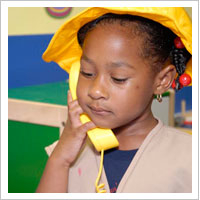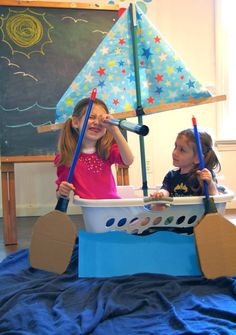
April 9, 2015 9:19 am The Importance Of Pretend
We’ve all heard children doing it – deciding who will be the mom, the dad, the sister, the puppy. Or maybe they’re playing restaurant, with a chef, a waiter, and a hungry customer or two. Or assuming the roles of a serious but kind doctor, a sick person who needs an operation, a mom with a feverish baby. Children love to make-believe. The more they do it, the more nuanced their performances become.
What may not be obvious is how important this activity is to a child’s development. Pretend play is the most important factor in helping children gain the essential cognitive skill called “executive function.” Executive function develops when children make a plan for play, begin to carry it out, and then adapt and change it according to what others in the play do. The child plans, “I will be the mother. I will hold my baby and stir a pot and talk to my friend on the phone about going shopping. When the dad comes home, I will ask him what he wants for dinner.” Depending on what “the dad” asks for, “the mom” will come up with a reply: “We don’t have steak, dear, how about spaghetti?” She will then continue to carry on the make-believe. “How was your day? Can you hold the baby while I cook?”
The play seems simple but many cognitive areas are being strengthened. First, memory: the child has to hold in her mind the role she is playing, and the roles of others. During this play, children talk to themselves about what they are going to do and say, and how they will do it. Then as they respond to the other players, the give and take of pretend requires them to practice adaptability, flexibility and quick thinking.
I have written a lot about the importance of self-regulation. In pretend play, the child has to self-regulate; she has to stick with the role she is playing and act consistently. If she is the mom, she has to act like a mom, not a 4-year old child. If someone in this scenario begins acting out of character, the others will quickly correct him or her. “You can’t start playing with the trucks, you’re the dad!”
As a final advantage, children use their most sophisticated speech when they are engaging in pretend. The “mom” has to talk like a mom. “I am going out to the grocery store. I’ll bring chocolate mousse cake for dessert. Please play nicely while I’m gone.” Children want to sound like the characters they are playing. They can be especially funny when they play doctor: “Your temperature is very high. Your heart is bad. I’m going to do an operation and take out all your blood, but you will be fine. Be sure to take your medicine.”
Good executive function skill is a better predictor of success in school than a child’s I.Q. Luckily, it is a skill that can be acquired, practiced and improved. How great that the best way to practice it is through make-believe play, which children do naturally. All they need is the opportunity and the free time to play creatively with others.
Marianne Riess is the former head of the Putnam Indian Field School in Greenwich, CT. She has 40 years experience in working with young children.






